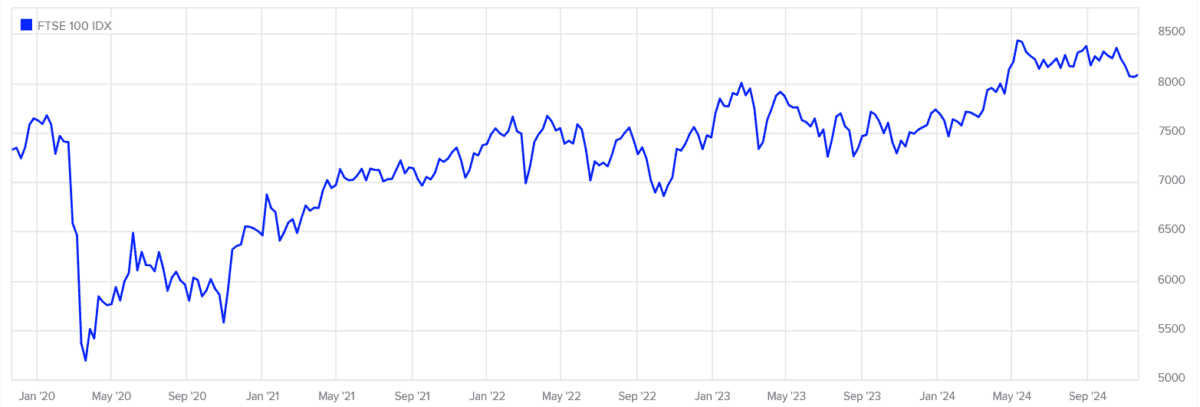The FTSE 100 is the UK’s flagship share index, and it attracts significant investor interest at home and abroad. It’s famous as the residence of major, well-established companies with massive global reach and expertise across sectors. Major names include Lloyds, BP, and AstraZeneca.
The Footsie is also seen a barometer for the health of Britain’s stock market and economy. Unfortunately, this has affected returns in more recent years due to tough economic conditions and extreme political turbulence.
So how much would I have made if I’d invested £5,000 in an FTSE 100 tracker fund back in November 2019?
Returns on £5k
Five years ago, the FTSE was sitting pretty at 7,346.53 points. Then the pandemic came and the world closed down, causing global stock markets to crash. The index came within touching distance of 5,000 points at one point.
There have been a few bumps along the way. But the flagship index has recovered steadily since then, hitting new record highs in that time (the current closing record of 8,433.76 was set in May).
At 8,267.03 points today, investors have enjoyed a 12.5% gain during the past five years. However, this doesn’t take into account dividend income.
With dividends factored in, the Footsie has delivered a total return of 33.1%.
Based on this, if I’d invested £5,000 in a FTSE 100 tracker fund in November 2019, I’d now have £6,655 sitting in my trading account.
Superior performances
That’s far from terrible. After all, share prices can go down as well as up. And with stock markets enduring obstacles like Covid-19 and surging interest rates in recent years, I could have well made a negative return.
Having said that, the FTSE 100’s performance over the period has also substantially lagged those of other major global indexes.
The US-based S&P 500, for instance, has delivered a total return of 100% in the past five years. And the Nikkei in Japan has provided a cumulative return of 80.5%.
A £5k investment in a fund tracking these indexes, therefore, would have delivered me £10,000 and £9,025 respectively, excluding the impact of currency fluctuations.
A top FTSE 100 share
Yet none of this means that the FTSE 100 is a poor place to invest today.
Past performance is not a reliable indicator of the future, for one. What’s more, some analysts believe UK shares may outperform their overseas counterparts in the coming years following their underperformance of recent years.
Associated British Foods (LSE:ABF) is one such stock I think could soar in value from this point. It’s fallen 15% in value over the past five years. And so it trades on an undemanding forward price-to-earnings (P/E) ratio of 11.3 times.
This is well below the FTSE 100 average of 14.3 times. And it, in my opinion, fails to reflect the sparkling potential of the firm’s core Primark budget clothing division.
Sales and adjusted operating profit here soared 6% and 51% during the 12 months to September. Despite competitive threats, Primark’s attractive prices and strong branding mean that customers continue to flock through its doors.
Encouragingly, ABF plans further rapid expansion in key European and North American markets to take earnings to the next level. If recent successes continue, I think it could be one of several FTSE shares that take off in the coming years.
This post was originally published on Motley Fool







